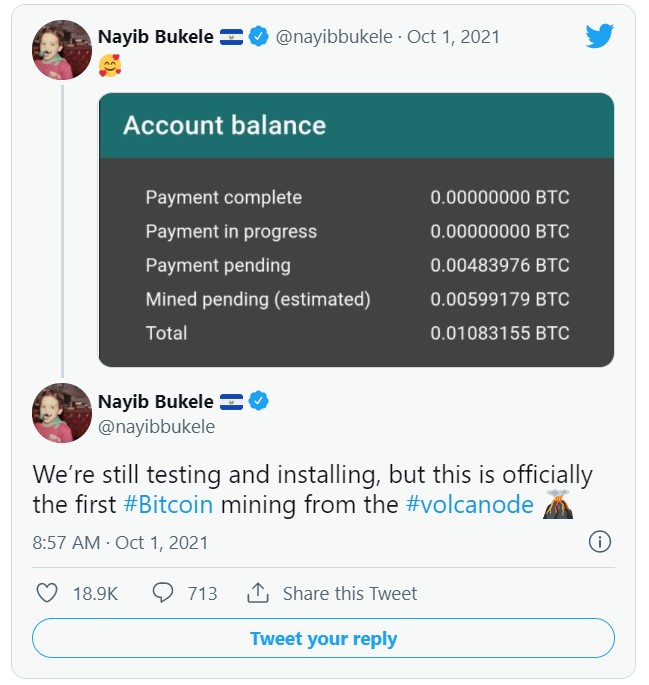El Salvadoran President, Nayib Bukele has been making crypto news headlines since taking office in 2019 with his plans to introduce Bitcoin as legal tender in an attempt to transform the poverty-stricken country into a crypto-friendly business hub.
In early September this year, El Salvador became the first country in the world to include Bitcoin as legal tender, with over $225 million invested to increase the government’s stockpile to 550 Bitcoins, launching a project designed to solidify the country as a world leader in cryptocurrency.
The Salvadoran government has since introduced its own virtual wallet called “Chivo”, which is Salvadoran slang for “cool”. This crypto wallet gives residents access to cross-border transactions with zero fees – an incentive to urge the local population to use the wallet.
The El Salvadoran President had another bright idea; to create a state-owned Bitcoin mining operation using geothermal energy, which has now become a reality.
Bukele Tweeted on Friday that El Salvador had minted the very first volcano-powered Bitcoin. The President referred to the mining operation as the “Volcanode” shortly after posting a video earlier last week of a geothermal Bitcoin mining operation. The video, captioned “First steps…”, has since gone viral and has seen over 2.3 million views.
Bukele’s Twitter post on Friday revealed an account balance showing that this new operation has successfully mined 0.00599179 Bitcoin valued at around $280. Bukele said that El Salvador is “still testing and installing” the geothermal operation but confirmed that the project is off to a good start.
It seems that skepticism around El Salvador’s Bitcoin project is at an all-time high as many El Salvadorans doubt that the country’s move toward Bitcoin is wise, as it would mean that El Salvador’s economy would be pegged to the highly volatile price fluctuations associated with cryptocurrencies.
A survey conducted by the Central American University has shown that nearly 70% of El Salvadorans are against Bitcoin as a legal tender, either because they have little confidence in Bitcoin itself, or due to a lack of knowledge around cryptocurrencies in general.
On a positive note, the value of Bitcoin, along with 30 of the biggest cryptocurrencies saw major growth on Friday following the news. Bitcoin gained about 10%, Ethereum more than 7%, Ripple jumped 7.6%, and Cardano rose by more than 5.5%.
Bitcoin mining is an energy-intensive process using high-powered computers to create mining rigs that confirm virtual transactions on the blockchain network. The mining rigs consume vast amounts of electricity which has brought numerous environmental concerns to light.
In countries like China, where renewable energy is scarce, Bitcoin mining has led to increased carbon emissions from the industry as a whole since most of the Bitcoin mining operations were located in these regions. However, since China’s ban on cryptocurrency and related services, the carbon emissions from Bitcoin Mining have started to decline.
This new volcano-powered Bitcoin mining project from El Salvador is one more solution to the environmental concerns related to the minting of Bitcoin and other similar cryptocurrencies. But this is not the first time that volcanic energy is used for Bitcoin mining. In Iceland and Norway, where nearly 100% of all electricity comes from renewable sources, volcanic geothermal energy has been used to mine Bitcoin for years.
One Bitcoin miner, Alejandro de la Torre who recently made the move from China to Texas, said that “It’s just geothermal energy,” and that “Iceland has been doing it since the very, very beginning of bitcoin mining.”
El Salvador has been nicknamed the “land of the volcanoes” and geothermal energy already accounts for nearly a quarter of the country’s energy production. It will be interesting to see how this project fairs and if El Salvador will accomplish its goal of becoming the Bitcoin capital of the world.


Leave a Reply